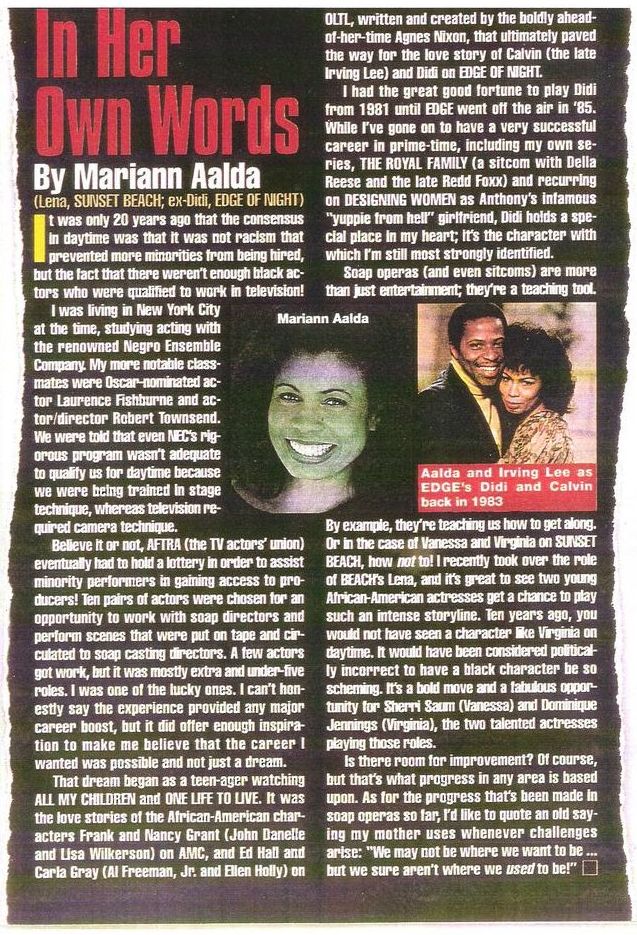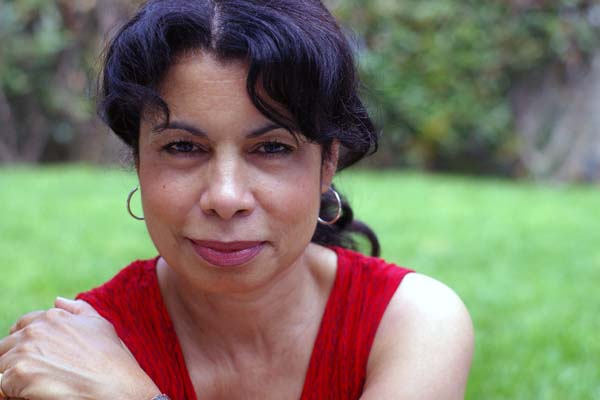By Mariann Aalda
Part #2
Part #1
To give a historical perspective, here’s a television interview on diversity in daytime that I did in 1982…
Fifteen year’s later, here’s an article I wrote on diversity for Soap Opera Digest, circa 1998:

Which brings us to today… almost 30 years after the interview and 13 years after the article, where what I see as the biggest change is that with the huge impact of cable TV and technology, soap operas are no longer the driving force of daytime television.
Soaps now not only have to compete with other soaps, talk shows, game shows, courtroom shows and “reality” TV shows on the major networks, but with cable TV, DVRs, video-games and the internet as well. The result being that with all the entertainment options now available, an excellent case can be made for there being “something for everybody.”
The thing that always made soaps unique, though, was that they weren’t a just an audience diversion, they were an engagement…with viewers making emotional investments in their favorite stories and characters.
Diversionary chat, news, judge and game shows notwithstanding, today a lot of people are making an emotional investment in chat rooms, on their facebook pages, on their blogs and with narrative video games…all of which are giving traditional soaps a run for their money.
And let’s face it, it’s ALL about the money. In fact, Procter & Gamble pioneered the production of daytime dramas specifically for the purposes of selling more soap, which is why they became known as “soap operas.”
The fact that P & G is no longer in the business of producing soap operas is pretty telling. They did, however, renew a third season of “My Black Is Beautiful” which they produce and air on BET (Black Entertainment Network). And that’s pretty telling as well.
So, looking at the bigger picture, is the conversation about diversity in soap operas already moot?
Especially when Oprah, a black woman, is the most influential person on daytime today and is about to launch her OWN network; Ellen DeGeneres, an openly gay woman hosts her own daytime talk show; two black men, Wayne Brady and Steve Harvey are hosts of network game shows ("Let’s Make a Deal" and "Family Feud"), and shows on Telemundo and Univision (Spanish cable networks) often beat regular network programming in the ratings.
In response to one of Kyra’s comments -- as much as I’d like to see a black, Erica Kane-like diva character on one of the soaps (and as much as I’d like to have an opportunity to portray one!) --
maybe we should be looking at the inroads made in other entertainment arenas and delivery-system technologies, and at the opportunities for the greater diversity that they provide.
Because like Bob Dylan says in his song, The Times, They are A-Changin’:
As the present now
Will later be past
The order is
Rapidly fadin'
And the first one now
Will later be last
For the times they are a-changin'.
The song was written more than forty years ago, but still holds true, begging to ask the question: “What is the relevancy of diversity on soaps if the soaps, themselves, are on their way to becoming irrelevant?”
It would sadden me to see soaps leave the daytime landscape…then, again, I still miss "Gunsmoke."
***
 Mariann Aalda played DiDi Bannister-Stoner on Edge of Night from 1981 to its final episode on December 28, 1984. She also played Grace Battles on Guiding Light and Lena Hart on Sunset Beach. She is currently starring in M.O.I.S.T.! -- the "sex-istential" comedy-with-music celebrating the seasoned woman -- which she co-wrote/produced/performs with Iona Morris (ex-Fiona Griffin, As The World Turns).
Mariann Aalda played DiDi Bannister-Stoner on Edge of Night from 1981 to its final episode on December 28, 1984. She also played Grace Battles on Guiding Light and Lena Hart on Sunset Beach. She is currently starring in M.O.I.S.T.! -- the "sex-istential" comedy-with-music celebrating the seasoned woman -- which she co-wrote/produced/performs with Iona Morris (ex-Fiona Griffin, As The World Turns).
Check out her on-going saga, Edge of Night Today at: http://eontoday.blogspot.com/

Which brings us to today… almost 30 years after the interview and 13 years after the article, where what I see as the biggest change is that with the huge impact of cable TV and technology, soap operas are no longer the driving force of daytime television.
Soaps now not only have to compete with other soaps, talk shows, game shows, courtroom shows and “reality” TV shows on the major networks, but with cable TV, DVRs, video-games and the internet as well. The result being that with all the entertainment options now available, an excellent case can be made for there being “something for everybody.”
The thing that always made soaps unique, though, was that they weren’t a just an audience diversion, they were an engagement…with viewers making emotional investments in their favorite stories and characters.
Diversionary chat, news, judge and game shows notwithstanding, today a lot of people are making an emotional investment in chat rooms, on their facebook pages, on their blogs and with narrative video games…all of which are giving traditional soaps a run for their money.
And let’s face it, it’s ALL about the money. In fact, Procter & Gamble pioneered the production of daytime dramas specifically for the purposes of selling more soap, which is why they became known as “soap operas.”
The fact that P & G is no longer in the business of producing soap operas is pretty telling. They did, however, renew a third season of “My Black Is Beautiful” which they produce and air on BET (Black Entertainment Network). And that’s pretty telling as well.
So, looking at the bigger picture, is the conversation about diversity in soap operas already moot?
Especially when Oprah, a black woman, is the most influential person on daytime today and is about to launch her OWN network; Ellen DeGeneres, an openly gay woman hosts her own daytime talk show; two black men, Wayne Brady and Steve Harvey are hosts of network game shows ("Let’s Make a Deal" and "Family Feud"), and shows on Telemundo and Univision (Spanish cable networks) often beat regular network programming in the ratings.
In response to one of Kyra’s comments -- as much as I’d like to see a black, Erica Kane-like diva character on one of the soaps (and as much as I’d like to have an opportunity to portray one!) --
maybe we should be looking at the inroads made in other entertainment arenas and delivery-system technologies, and at the opportunities for the greater diversity that they provide.
Because like Bob Dylan says in his song, The Times, They are A-Changin’:
As the present now
Will later be past
The order is
Rapidly fadin'
And the first one now
Will later be last
For the times they are a-changin'.
The song was written more than forty years ago, but still holds true, begging to ask the question: “What is the relevancy of diversity on soaps if the soaps, themselves, are on their way to becoming irrelevant?”
It would sadden me to see soaps leave the daytime landscape…then, again, I still miss "Gunsmoke."
***
 Mariann Aalda played DiDi Bannister-Stoner on Edge of Night from 1981 to its final episode on December 28, 1984. She also played Grace Battles on Guiding Light and Lena Hart on Sunset Beach. She is currently starring in M.O.I.S.T.! -- the "sex-istential" comedy-with-music celebrating the seasoned woman -- which she co-wrote/produced/performs with Iona Morris (ex-Fiona Griffin, As The World Turns).
Mariann Aalda played DiDi Bannister-Stoner on Edge of Night from 1981 to its final episode on December 28, 1984. She also played Grace Battles on Guiding Light and Lena Hart on Sunset Beach. She is currently starring in M.O.I.S.T.! -- the "sex-istential" comedy-with-music celebrating the seasoned woman -- which she co-wrote/produced/performs with Iona Morris (ex-Fiona Griffin, As The World Turns).Check out her on-going saga, Edge of Night Today at: http://eontoday.blogspot.com/
2 comments:
I think the main issue with race I would love to see soaps (even the ones no longer on television but via the internet) tackle is that certain ethnic groups are not "foreign" or "exotic".
We are all people. And people have individual struggles, regardless of what race they are. And I think that is what makes soap operas so compelling to so many people.
Blacks and Hispanics do have roles and parts to play, but the Asians are almost always shunted aside as "gangsters", "mobsters" and "exotic".
It's sad to see the state of diversity on TV.
General Hospital is considered to be ABC's flagship soap but it has very little diversity. There are two black women on contract who get little air time. Although the mobster Sonny Corinthos is Hispanic, his Latin heritage is downplayed and he is coded as white.
The Young and the Restless used to have a vital and noteworthy African-American cast that was well integrated. Now, most of black cast members appear sporadically in supporting roles.
When Hispanics do appear, they usually are portrayed by white Hispanics, white actors or are paired with actors. It's rare to see dark Mestizo, or non-white Hispanics on soaps.
It's very discouraging.
Post a Comment